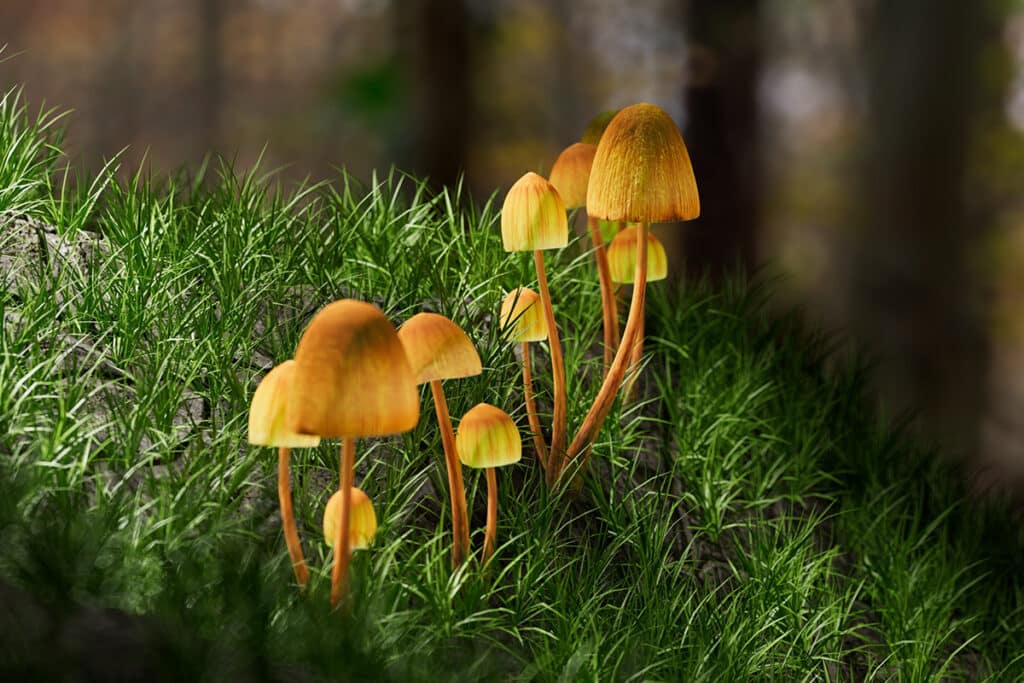Volcanoes are erupting in The Philippines, but on-fire Australia received some welcome rain. The Iran war cries have been called off and The Donald’s military powers are about to be hamstrung by the Senate. Meanwhile, his impeachment trial is starting, and we’re all on Twitter for a front-row seat.
Progress in 5 Minutes: Psychedelics to the rescue
Long-overdue research about, legalization of, and enthusiasm for therapeutic psychedelics are spreading.

Psychedelics, an umbrella term for hallucinogenic drugs like psilocybin, LSD, and MDMA, have been used in indigenous communities and religious contexts for thousands of years. As the United States faces the dual opioid and mental health crises, researchers and clinicians are turning to psychedelics as a therapeutic method to access deeply held trauma and to help the brain rewire itself.
Along with a number of scientific studies that find psychedelics promising in treating depression, anxiety, post-traumatic stress disorder (PTSD), addiction, and other mental health conditions, laws in some US states and municipalities are paving the way for legal and regulated psychedelics, which means that more people will soon have access to them.
The backstory
With all of the promise that psychedelics appear to provide, it’s crazy to think we hadn’t thought of it earlier! Just kidding; we’ve been here before.
The US Central Intelligence Agency ran an infamous study beginning in the early 1950s called MK-Ultra on mind control that included the use of psychedelics, sensory deprivation, hypnosis, and psychological torture. The highly unethical experiments led to a public outcry when the program was revealed in the 1970s.
Psychedelics were popular—and legal—during the counterculture era of the 1960s. Researchers in that era were interested in learning more about the consciousness-expanding potential of psilocybin, which is naturally found in certain varieties of mushrooms; LSD, a synthetic drug; and peyote, which is found in certain cacti. Psychology professors Timothy Leary and Richard Alpert (later known as Ram Dass) famously studied psychedelics at Harvard University; the Harvard Psilocybin Project came to an end when Harvard fired Alpert for giving an undergraduate student psilocybin when only graduate students had been permitted to join the research studies. Leary was also dismissed.
The Controlled Substances Act of 1970 classified psychedelic substances as Schedule 1 drugs, deemed by the Drug Enforcement Administration as having “no currently accepted medical use and a high potential for abuse.” (Other Schedule 1 drugs include heroin and marijuana.) Since psychedelics were no longer legally accessible, and because the existing research raised many ethical questions, the idea of therapeutic psychedelics disappeared for a few decades.
But by the 1990s and early 2000s, a new field of psychedelic research and researchers were emerging. Today, there is a growing body of published work on psychedelics and dedicated research institutes like the John Hopkins Center for Psychedelic and Consciousness Research, which was the first institute approved by regulators to conduct research in 2000, and the University of California Berkeley’s Center for the Science of Psychedelics, which opened in 2020.
In 2018, the US Food and Drug Administration designated psilocybin as a “breakthrough therapy,” essentially fast-tracking the drug’s development and review process. Earlier this year, the FDA issued a “draft guidance” on psilocybin research intended to help researchers developing clinical trials, including safety measures against abuse and other considerations.
So, in a very short time, we have findings that point to positive results of psychedelic therapy for anxiety and depression, cancer, severe PTSD, alcoholism, opioid addiction, those with early onset Alzheimer’s, and many other health conditions.
State-by-state legalization
Though the momentum of psychedelic legalization feels like the rapid-fire changes we saw with marijuana, the rollout of psychedelic access looks a little different. In 2019, Denver became the first US city to decriminalize psilocybin.
Oregon was the first state to take the plunge, in 2020, when voters legalized the administration of psilocybin to Oregonians over the age of 21. Unlike cannabis, which is sold in government-regulated dispensaries in the US states where the drug has been legalized, psilocybin in Oregon must be taken at a “service center” under the supervision of a certified facilitator. The psilocybin therapy patient doesn’t need a referral or prescription, as is the case with medical marijuana, but patients must attend a preparation session and be approved for the treatment. “Integration sessions” are available after the psilocybin therapy to connect the patient to community resources and peer groups to help them continue processing their experience.
Oregon issued its first psilocybin license to EPIC Healing Eugene, located in the state’s second most populated city, in May 2023, and the clinic opened the following month. The Associated Press (AP) reported in September that the Eugene clinic has a waitlist of more than 3,000 patients for a session. The AP also spoke with other Oregon-based businesses that have since opened with significantly smaller waitlists. The going rate for psychedelic therapy in the state can cost more than $2,000.
Colorado was next, with voters approving Prop. 122 in November 2022. The measure decriminalized psilocybin statewide and allowed for state-approved treatment centers to distribute the drug to patients in a supported setting. The state is expected to start accepting applications for psilocybin facilitators and centers in late 2024. Decriminalization measures started in 2023, so Coloradans can legally possess or give away (but not sell) psychedelic mushrooms. They are also allowed to grow mushrooms on private property as long as the plants are contained in a 12-by-12-foot area.
An academic paper published in 2023 on psychedelics legislative reform and legalization found that half of US states have considered reforms either in the legislature or by ballot measures (like Oregon) and that it is an increasingly bipartisan issue. (Both Republican and Democratic lawmakers introduced and passed amendments in the House on studying psychedelics in 2022, though the bills didn’t make it past the Senate.) Other findings include the steady increase of bills related to the decriminalization, legalization, and study of psychedelics introduced—from five in 2019 to 36 in 2022—and the authors’ analysis predicts that the majority of US states will legalize psychedelics by 2033–2037.
Most recently, California lawmakers moved to decriminalize psychedelics, but Gov. Gavin Newsom vetoed the bill, saying that more regulation of psychedelic substances needed to be in place before decriminalization. Several California cities have decriminalized psychedelics, and there is momentum for a November 2024 ballot initiative.
While drug decriminalization has long been an issue associated with blue states and Democratic elected officials, those on the right are increasingly open to psychedelics, especially with regard to PTSD and military service. Earlier this year, a New York Times headline called veterans the “unlikely lobbyists” for legalizing psychedelics. The article highlights how veterans’ stories of suffering have persuaded staunch anti-drug Republican lawmakers, like former Texas Governor Rick Perry and Rep. Dan Crenshaw, a former US Navy Seal, of the treatment’s potential.
In November 2023, Republican presidential candidate Vivek Ramaswamy said on X that he supported the decriminalization of Ayahuasca and Ketamine for veterans with PTSD as a “holistic” approach to preventing suicides and overdoses.
Global perspectives
Earlier this year, Australia became the first country in the world to legalize psychedelics for mental health use. Patients down under can be prescribed MDMA or psilocybin by their psychiatrist.
Portugal decriminalized the possession of all drugs in 2001 (possession is still illegal but is subject to a fine instead of a criminal charge). Contrary to popular belief, marijuana and psychedelics are illegal in The Netherlands, but societal tolerance and legal loopholes mean that these drugs can be bought in retail stores. As of April 2023, 11 clinical trials in Europe are studying psilocybin, four MDMA, and one LSD, according to an article published in the European Pharmaceutical Review, which adds that “in terms of legislature and regulator engagement, Europe has up to now been lagging significantly behind in its approach to psychedelics as compared to other nations.”
Brazil, Nepal, and the Bahamas allow psilocybin use, and Ayahuasca, which has a longstanding connection to indigenous religions, is legal in Brazil, Peru, Mexico, and other South and Central American countries.
Naysayers and what comes next
Therapeutic psychedelics have generated significant enthusiasm, marked by their potential for positive impact. There are lingering concerns about adverse effects, such as the unsettling “bad trips,” which can leave individuals feeling frightened or disassociated. Consequently, in states where psychedelics are legalized, consumption is tightly regulated and supervised by trained professionals to ensure safe and responsible usage.
Oregon Public Radio cited opponents as concerned with illegal growing, water use, and human trafficking—all issues associated with the cannabis growing industry in the state. Cannabis growing uses a significant amount of water, which several states are working to address through regulation, and there have been instances of black market growing operations with workers who had been trafficked; opponents see the potential for both happening in psychedelic cultivation.
Psychedelic research is already attracting significant research funding from both public and private investors, to the tune of $526 million in 2022 alone. As psychedelics have long been used in indigenous communities, there are ethical questions that arise around the appropriation, commodification, and regulation of these traditional medicines.
Another big question is how health care companies, providers, and the federal government will embrace psychedelic treatments. A recent Rand Corporation analysis piece asks, for example, how the Indian Health Service, which serves an estimated 2.5 million American Indian and Alaska Natives, might integrate therapeutic psychedelics, which are used in traditional healing. The article says the IHS is “well-positioned to be a federal leader in clarifying how psychedelic treatments are discussed with patients, monitored for safety, and possibly reimbursed.”
There are a lot of kinks to work out in the legalization of psychedelics and making sure everyone who would benefit from the therapy can affordably access it. Long-overdue research on psychedelics backing up indigenous wisdom that has supported plant healing for millennia, coupled with enthusiasm from the public and lawmakers, there is a lot to anticipate in the future.


